Perfume: The Story of a Murderer
 for aberrant behavior involving nudity, violence, sexuality, and disturbing images.
for aberrant behavior involving nudity, violence, sexuality, and disturbing images.
Reviewed by: Kenneth R. Morefield
CONTRIBUTOR
| Moral Rating: | Extremely Offensive |
| Moviemaking Quality: |
|
| Primary Audience: | Adults |
| Genre: | Thriller Adaptation |
| Length: | 2 hr. 27 min. |
| Year of Release: | 2007 |
| USA Release: |
January 5, 2007 |
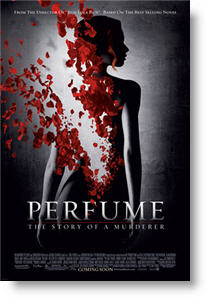
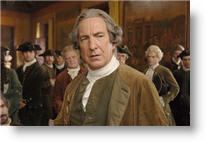
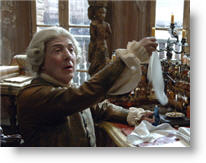

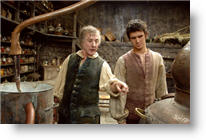
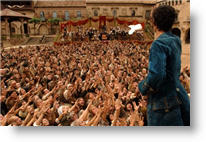



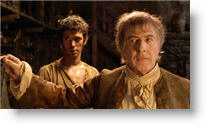
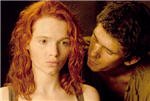
Why does God allow innocent people to suffer? Answer
What about the issue of suffering? Doesn’t this prove that there is no God and that we are on our own? Answer
Does God feel our pain? Answer
The Origin of bad—How did bad things come about? Answer
What are the consequences of sexual immorality? Answer
How can I deal with temptations? Answer
| Featuring |
|---|
| Karoline Herfurth, Ben Whishaw, Dustin Hoffman, Alan Rickman, Rachel Hurd Wood |
| Director |
| Tom Tykwer (“Run Lola Run”) |
| Producer |
| Bernd Eichinger, Martin Moszkowicz, Gigi Oeri |
| Distributor |
“He lived to find beauty. He killed to possess it.”
Warning: Major plot spoilers in this review.
To describe “Perfume: The Story of a Murderer” as a costume drama about an eighteenth-century serial killer is to see the body but miss the scent. Yes, it follows Jean-Baptiste Grenouille (Ben Whishaw), a French orphan as he rises from the slums to an apprenticeship in the world of perfuming, and yes, he wracks up a bigger body count than Jack the Ripper did in “From Hell.” The film’s eleventh hour transition, though, from genre crime piece to philosophical fairy tale suggests it sees something profound and meaningful in the story and that we should too. How most people feel about the film will depend in large part to how they react to the risky turn it takes in its final act, and it is not a good sign that there was a fair degree of derisive laughter in the theater where I saw it.
Then again, Michelangelo Antonioni’s masterpiece “L’Avventura” was famously hissed when it played at Cannes in 1960, so it’s always a risky proposition to make critical judgments based on exit polling.
Long before the last twenty minutes when “Perfume” either blasts into the stratosphere or dives off the proverbial deep end—and it’s hard for me to imagine that it won’t engender rapturous praise from some circles and withering scorn from others—it has probably already exceeded any threshold for objectionable content that the sorts of people who have thresholds for objectionable content are likely to have. Viewers who are sensitive to (or find objectionable) depictions of violence, nudity, or sexual content are strongly cautioned.
That’s not to say that “Perfume” lacks sufficient artistic merit and the thematic seriousness so that some Christian could not construct a carefully considered, nuanced defense of it on moral, as well as artistic, grounds. Based on my affinity for director Tom Twyker’s previous work (“Run Lola Run;” “The Princess and the Warrior,” and the exquisite “Heaven” based on a script from “Dekalog” creator Krzystof Kieslowski), I thought I just might be the Christian to do it.
I’m not.
And because this review was prepared for a Christian Web site, I suppose I should say that while my reasoned response to the film was admiration for its technical achievement, my visceral, intuitive response was one of sadness and frustration that so much talent and brilliance should be in the service of something that struck me as having such a miserably depressing view of life.
Here are some of my reservations:
Film is a predominantly visual medium. Sound also plays a big part in the experiential reception of film, but absent a few marketing gimmick novelties, movies are neither a tactile nor olfactory experience. To make a film about a character and a world dominated and defined by the sense of smell is an interesting intellectual exercise, but watching a genius artist work on an interesting technical problem isn’t quite the same as looking at a great work of art.
As a result the best things about “Perfume” are divorced from its content. Yes, the expressionistic moments conveying smell are dizzyingly sublime: a long tracking shot of scents that Grenouille is inhaling that moves over the landscape and seamlessly into the water; a 360 degree dolly shot around perfumer Giuseppe Baldini (Dustin Hoffman) that expressionistically conveys the intoxicating richness of the potion he has just inhaled; a highly accelerated tracking shot that follows the road on which Grenouille is running from his current location, across the countryside, all the way to the woman on horseback whom he is tracking; an over-the-shoulder shot of a man crawling over a rooftop culminating in a reveal shot of a bloodthirsty mob in the court below. On the level of pure aesthetics, “Perfume” is a profoundly beautiful film, even when it is showing some hideously ugly things.
It is possible, I think, to make great works of art in which the world view of the characters is pessimistic, cynical, nihilistic or in other ways contrary to one’s audience. It is harder (but still possible) to create one in which the world view of the work itself is at odds with its reader/viewer. Usually conveyed by tone (the author’s conveyed attitude towards the subject matter) more than content, a work of art’s philosophy may be cynical, negative, unorthodox, or hopelessly muddled and still provide a deep reservoir of ideas for readers (or audiences) to meditate on. (“The Sopranos”, “Dogville,” some of the work of Alfred Hitchcock, “The Simpsons”, and “South Park” are examples of this category for me.)
“Perfume” stops short of glorifying its murderer-protagonist in a Byronic or Romantic, anti-hero sort of way, but neither does it appear to view Grenouille in orthodox moral terms. The first and seminal murder evoked oddly self-contradictory echoes of Mary Shelley’s Frankenstein and Richard Wright’s Native Son. The murderer is not evil, but neither (seemingly because of his tortured and isolated upbringing) does he have any socially developed sense of right and wrong.
The first murder may in fact be an accident, a panicked attempt by a man unaware of his strength and not used to interacting with life on any level other than action that goes horribly wrong. He may be a sociopath, environmentally created by a lifetime of neglect. He may be a tabula rasa on which a violent and meaningless world has written the word “evil.” He may be an evolutionary, alienated mutant, cut off from understanding (or being understood by) the world in orthodox terms. What Grenouille never is, however, is just a man, and so his actions never have any moral consequences for himself or that we are allowed to extrapolate and apply to our own experiences. A positive moral reading of the film would almost have to be allegorical, I would think.
The Patrick Süskind novel from which the film is adapted has a nasty attitude towards its world that I distrust, a sort of contempt for the people who are not Grenouille, the scent of which wafts over from the novel and is, in its way, as problematic as the material’s tone toward the murder himself. Let us take as an example, the character of Madame Gaillard, the mother who boards the orphaned Grenouille for several years before selling him into service. She is a largely amoral character whose only wish in life is to secure an annuity so that she does not have to die in a public hospital. After she sells Grenouille into service at a tannery, the narrator flashes forward fifty years to inform the reader that although she eventually achieves her life’s goal, a revolution ironically strips her of the accumulation from her life’s work, leaving her with the exact end that she worked her whole life to avoid.
His final comment on her life: “Thank God Madame had suspected nothing of the fate awaiting her as she walked home that day in 1746, leaving Grenouille and our story behind. She might possibly have lost her faith in justice and with it the only meaning that she could make of life.” The film translates this patronizing attitude towards anyone whose attitudes towards or action in life are anything approaching conventional into an oddly out of place theodicy where supporting characters die immediately after Grenouille passes out of their immediate circle. Played seriously in the novel, this motif is a bit nasty; played for humor in the film it turns rank.
I’m tempted to say that “Perfume” appears to hate just about everyone that lives in its world, creating a dichotomy between the natural world, which is full of beauty and loveliness (where it is as yet uncorrupted by man’s stamp), and man who is always and only ugly. There may be a whiff of truth in that formula, something consistent with the theological views of the depravity of man, but it strikes me that there is a potential for transformation or deliverance from that state in orthodox evangelical thought that is nowhere to be found in the film.
Absent any source of innate human dignity, the world of the film leaves us little room to feel differently about Grenouille’s killing women than his killing his master’s cat. The murders are gross and alien but never sufficiently repugnant, largely for the reasons given above combined with the aesthetically beautiful way in which they are filmed.
I would also point out that while the film bends over backwards to remind us that Grenouille’s pathology is more that of a sociopath than a sadist, it largely elides or rushes past the murders themselves so that it can linger on their aftermaths, and in doing so downplays the suffering of the victims in a way that I found emotionally dishonest.
And that, in a nutshell may have been my biggest grievance with the film. The montage of the discovery of dead, naked women might very well be making some statement about the way women are dehumanized and objectified in society (or art), but the film’s lavish, luscious, lingering over Grenouille as he harvests the scent from their bodies borders on the sensationalistic or fetishistic. I would add, too, that the female characters are so underdeveloped that it is hard not to think of the film’s attitude toward the female body as one of objectification that is little different from Grenouille’s, however artistically they are posed or depicted.
In this day and age, I am reluctant to the point of refusal to call a film immoral. To do so is to imply a level of knowledge about the hearts and intentions of artists—many who have earned the benefit of a doubt over a period of time—which I think is arrogant to presume one has. I’ve also been on the other side of such cultural divides, finding much to value in difficult or challenging films that I thought others too arrogantly and ignorantly dismissed. That said, “Perfume: The Story of a Murderer” was a masterful achievement by an auteur whom I admire, but for which I developed a deep, visceral antipathy while watching that hardened rather than dissipated upon further reflection.
My Grade: A (but not recommended)
Violence: Heavy / Profanity: Minor / Sex/Nudity: Extreme
See list of Relevant Issues—questions-and-answers.


Extremely Offensive / 5
Extremely Offensive / 4½
Extremely Offensive / 5
JEAN BAPTISTE GRENOUILLE was born with a special gift, and curse; while it took him some years before all his other senses were developed, he was born with an amazing sense of smell. Now already it seems that this film would be doomed, the late Stanley Kubrick himself called the PATRICK SUSKIND novel unfilmable, and only when you read it do you truly understand. The experience of watching this movie is like the experience of watching RATATOUILLE (in a way, both FRENCH??…); in RATATOUILLE, throughout the whole film you felt hungry and had a kind of taste stuck in you head, with PERFUME, it’s almost as if you are smelling every perfume you’ve smelled as you watch.
Now how is this superb sense of smell a curse? One day as GRENOUILLE is in town, he smells something amazing, he follows the smell until he is face to face with a red headed girl. After a moment, he grabs her hand to try and smell better, she wrenches her arm away and runs away. He follows her, and when she begins to scream tries to silence her, but all too well. After the girl dies, he then realizes that the scent has gone away. He takes an apprenticeship with a perfumer (played magnificently by Dustin Hoffman, who quite obviously had a lot of fun with his role), intent on finding the secrets of how to capture scent, no matter what the cost.
The violence is actually surprisingly low considering the content of the movie; it is not presented with gore and blood and carnage. GRENOUILLE doesn’t kill to kill, nor doe’s he receive pleasure in torture or bloody deaths, but the film displays his disregard for human life, as he follows his nose, he doesn’t care who it takes, and that is displayed very well by the director in the scenes where all the bodies are found. The language is minor, asinine is the strongest word you will find here.
Sex is not a major issue (except for in a few very minor scenes and one huge scene that is very easily skipped over, although rather important), the problem really is the nudity. If you’ve seen THE GODS MUST BE CRAZY, then you’d probably know, the nudity is not used sexually, but instead used to display the situation as needed, and to show, as said, GRENOUILLE’S disregard for a human life. The nudity is needed for the impact of the film.
This film is often disturbing and at times hard to watch. Strange, aberrant, dark and pessimistic, yet… it is also an amazing achievement, beautiful at times even when it doesn’t seem it would (or should) be, and at times rather funny, but appropriately, not sickly.
It is hard too recommend this film to anyone due to its content, yet it is also hard not to recommend it due to how absolutely amazing the film is! In the end I’d have to say that if you decide to see this movie, then do it at your own caution.
Extremely Offensive / 5





My Ratings: Moral rating: Average / Moviemaking quality: 5